The US isn’t the only country that’s ‘Chimp Crazy’! A shocking map shows how 250 primates are kept as exotic pets in Britain. So does one live near you?
The documentary Chimp Crazy has wowed audiences with its look into the bizarre and dangerous world of the American monkeys.
But this shocking map proves the US isn’t the only country that has gone ‘Chimp Crazy’ as it reveals the location of 250 ‘dangerous’ primates living in Britain.
From critically endangered lemurs in Hertfordshire to a baboon in Berkshire, Britain is home to many more primates than you might think.
In Buckinghamshire alone, records show at least 30 capuchins and lemurs are kept in private hands.
So, could you live near the next Travis the Chimp?
As documentary Chimp Crazy shocks audiences, this map reveals the location of the 250 ‘dangerous’ primates living in Britain

The documentary Chimp Crazy reveals the bizarre and dangerous world of Tonia Haddix, America’s self-proclaimed ‘Dolly Parton of Chimps’
The majority of larger primates are legally considered ‘dangerous wild animals’, meaning a special permit is required to keep them.
In total, Britain will have issued more than 2,700 dangerous animal licenses by 2023, allowing private individuals to own species ranging from venomous snakes to big cats.
According to the latest data, almost 10 percent (256) of those permits were issued for dangerous primates.
On the interactive map below you can see how many dangerous wild animals are held in captivity in your province.
However, these data represent only a fraction of the actual numbers and it is estimated that there could be as many as 5,000 primates in the country.
Although there are no pet chimpanzees in Britain, even the smaller primates more commonly found in Britain can be dangerous.
Monkeys are known to attack their owners without warning and these risks are increased by the psychological consequences of being raised in captivity.
Chris Lewis, researcher and policy manager at animal campaign group Born Free, told MailOnline: ‘Primates are wild animals and can become aggressive and dangerous once they reach adulthood, especially if they are hand-reared.
‘Additionally, increased contact between humans and wildlife increases the likelihood of transmission of zoonotic pathogens in both directions, with both humans and primates at particular risk from herpes viruses and monkeypox virus.’
Of all the counties in Britain, Buckinghamshire has the highest number of pet primates; 31 are held privately.
Despite having a population of less than half a million, this small, rural county is home to 10 capuchins and 21 lemurs.
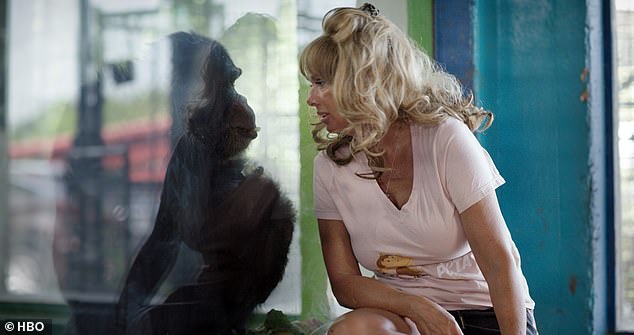
Chimp Crazy follows Tiger King director Tonia Haddix (pictured) as she goes to great lengths to evade authorities and animal rights groups while keeping a monkey hidden in her basement.
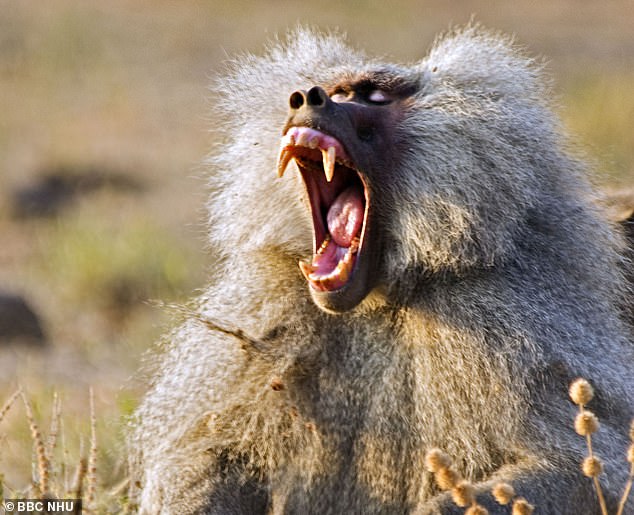
Records show more than 250 dangerous primates have been licensed in Britain, including one Hamadryas baboon (pictured) in Berkshire
Buckinghamshire is closely followed by Cornwall and Berkshire, which each have 30 primates.
Although the primates in Cornwall are all lemurs, Berkshire is home to a much more diverse mix of animals.
Private owners in Berkshire currently keep four capuchin monkeys, including the critically endangered Margarita Island capuchin, fifteen macaques and one grivet monkey.
Records show that the municipality has issued a permit for the possession of a Hamadryas baboon.
Although among the smallest of the baboon species, adult Hamadryas baboons can weigh 20 kg and grow sharp, two-inch-long canine teeth.
In areas where these baboons are native, a number of attacks have been reported, including a case in Saudi Arabia where a man was seriously injured by baboons while in his garden.
Fortunately, in this case, the baboon is housed at Lakeview Monkey Sanctuary, which is certified by the Global Federation of Animal Sanctuaries.
However, Mr Lewis points out that the fact that this permit has been issued reveals a bigger problem.
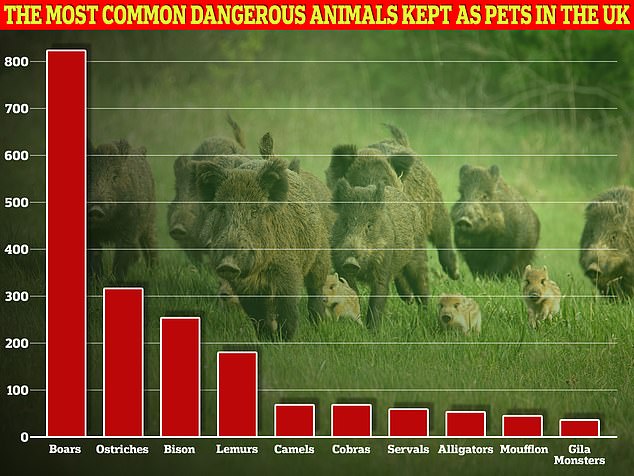
Local authorities have issued 2,700 permits for owning dangerous wild animals in 2023, of which almost 10 percent were for owning primates such as lemurs
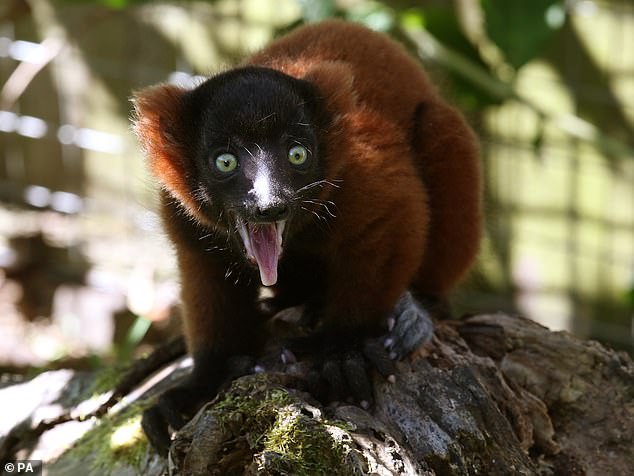
Private owners in Britain keep several critically endangered species of primates, such as the red-collared lemur. Pictured: a red-collared lemur at Blair Drummond Safari Park, Scotland
“The DWAA (Dangerous Wild Animals Act) still makes it legal for the general public to own baboons, which poses significant risk to any potential owner and the wider public,” Mr Lewis said.
‘Under zoo legislation, baboons are considered ‘Category One’, meaning they are likely to cause serious harm or pose a serious threat to life, based on danger and risk of injury, toxin or disease.’
The data also shows that a number of threatened species in Britain are being held by private owners who may be unable to meet their needs.
These include collared brown lemurs in Wiltshire, mongoose lemurs in Hertfordshire and spider monkeys in Lincolnshire – all of which are considered endangered or critically endangered.
While some primates are housed in legitimate sanctuaries and have the resources to care for them, this is not always the case.
Due to the intelligence of primates, they are not suitable for captivity and require extensive specialist care.
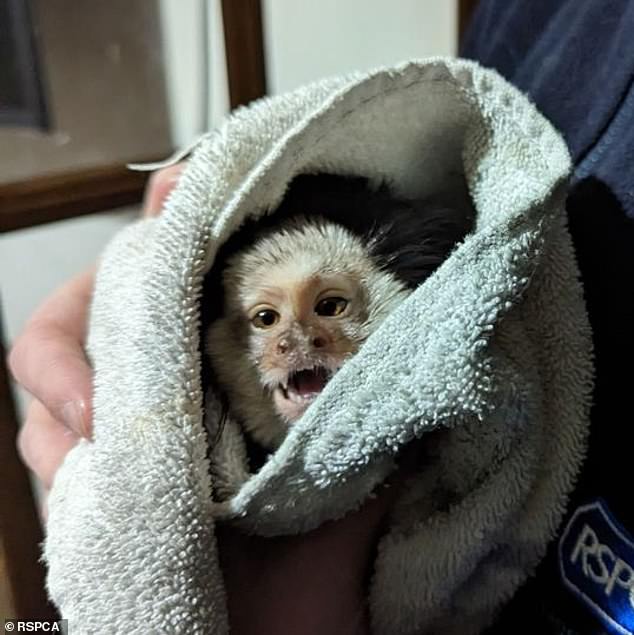
Experts warn that primates in captivity often receive extremely neglected care. Last year the RCPCA reported the rescue of a marmoset (pictured) found with severe metabolic bone disease
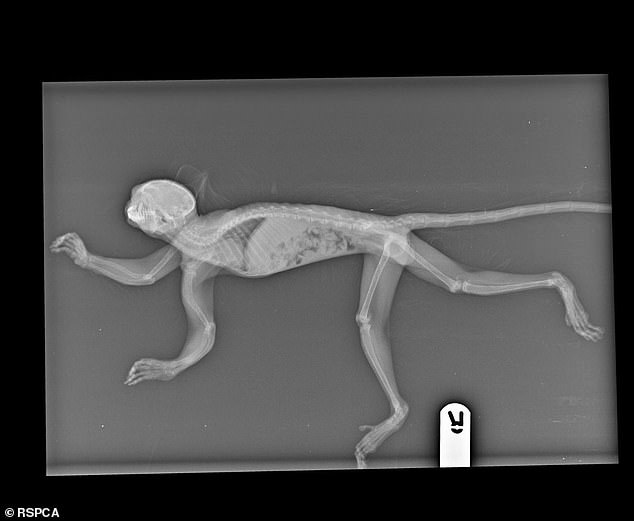
X-rays of the monkey showed that it had developed a bone disease that occurs when the animal becomes deficient in calcium or vitamin D3. The RCPCA says primates are not suitable for captivity and often develop health problems when kept in private homes.
Since March, owning a primate has become virtually illegal in Britain after new laws required the animals to be kept to ‘zoo standards’ – effectively banning them from private homes.
However, the new laws don’t come into effect until April 2026, so there are still hundreds of potentially dangerous primates living as ‘pets’ across the country.
An RSPCA spokesperson told MailOnline: ‘These animals are intelligent, aware and highly social – with complex needs that simply cannot be met in a home environment.’
‘Our inspectors and rescuers regularly see pet primates with behavioral problems and very poor health, especially metabolic bone disease (rickets in humans), due to completely inappropriate care.’
The spokesperson added that their inspectors have encountered primates “confined in bird cages, fed fast food, sugary drinks or even Class A drugs, deprived of others of their own kind, living in filth and squalor and suffering from disease.”
